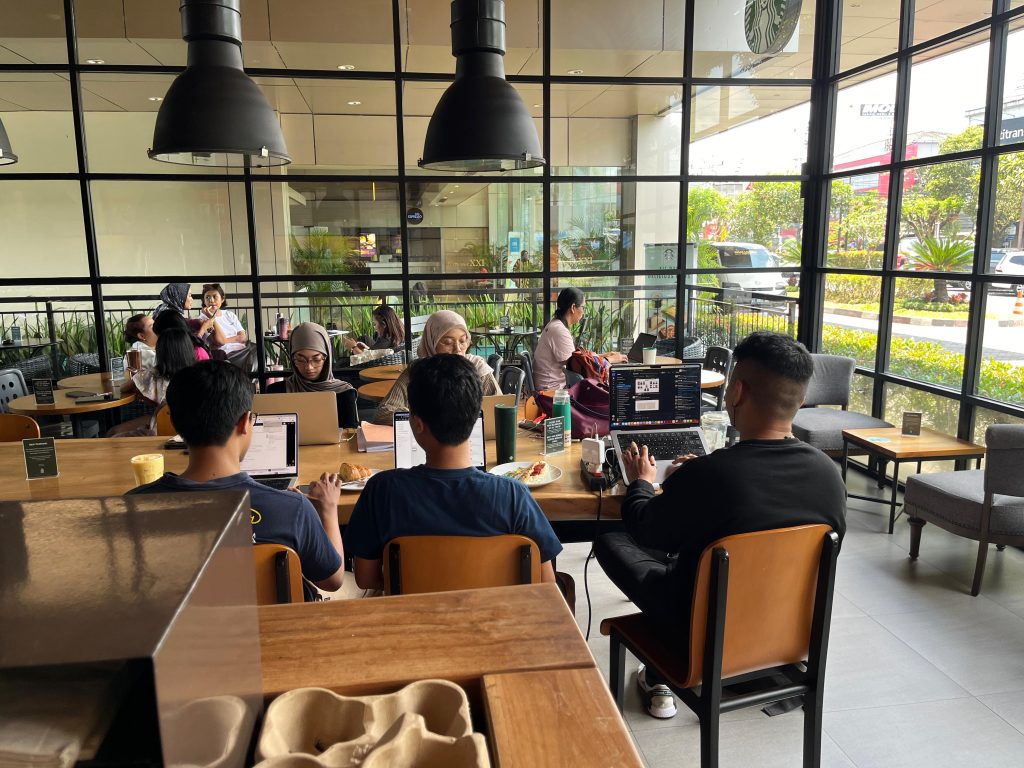My study estimates that there are approximately 2.3 million workers in Indonesia who rely on the gig economy for their primary source of employment and income. Most of them work in the transport and logistic sector, such as ride-hailing drivers, food delivery riders, and couriers. Others are online freelancers who use digital platforms to mediate their remote services, writes Muhammad Yorga Permana
_______________________________________________
“I believe online freelance work will not last long; it is impossible for someone to spend decades working only as a freelancer. There must be a saturation point. Eventually, they will think of having a new lifestyle.” Nugroho, 29 years, UX designer in Upwork
Over the past decade, there has been a substantial increase in participation in the gig economy mediated by digital platforms. This trend has been driven by the adoption of non-traditional work arrangements, which are heavily influenced by technological advancements, globalization, and the weakening influence of labor unions. On the one hand, the gig economy provides workers with the advantages of greater work autonomy and flexibility. On the other hand, it is also linked to problems such as low wages, unstable contractual positions, and a lack of job security.
My study estimates that there are approximately 2.3 million workers in Indonesia who rely on the gig economy for their primary source of employment and income. Most of them work in the transport and logistic sector, such as ride-hailing drivers, food delivery riders, and couriers. Others are online freelancers who use digital platforms to mediate their remote services.
From the Upwork data that I analyzed, platform-based online freelancers in Indonesia are primarily concentrated in the software development and technology sector (37 per cent), followed by the design and creative field (35 per cent), and writing and translation (13 per cent).
It is true that most gig workers in the transport sector are trapped in the gig economy and find it challenging to get out. In contrast, workers on online platforms view the gig economy as a stepping stone in their career progression. These individuals are highly skilled, well-educated, and have the potential to earn substantial incomes by providing their expertise through digital platforms. With their capabilities, they have successfully pivoted their careers and turned platform work into one of their multiple sources of income.
Nugroho has been working full-time as an online freelancer on Upwork for four years and earns an average of USD 3,000 per month, 20 times higher than the minimum wage in his city. However, Nugroho does not view his involvement in the platform as the final destination of his career. As indicated in the quote, he has developed ‘exit plans’ to eventually transition out of the gig economy ecosystem in the future.
In this article, I elaborate on the career trajectories of online gig workers in Indonesia. I highlight two primary paths for someone to avoid career stagnation in the gig economy: (1) becoming a permanent employee who works remotely for a particular company, or (2) being an entrepreneur by scaling up their gig service from freelancer to business owner.

The problem of digital platforms and the gig economy
As part of my PhD project, I interviewed 50 online platform workers in Indonesia spread across Bandung, Yogyakarta, Malang, Solo, and Semarang. I focused on those actively working on Upwork, one of the prominent freelancer platforms in Indonesia. The respondents recognised that digital platforms offer a distinct mode of work that is different from traditional employment. The primary advantage is the flexibility offered. Online platform workers appreciate not having to commute to a physical office, which allows them to spend more time with their families. Furthermore, they can organise their daily work routines by working anytime from any location.
Nevertheless, they also pointed out the dark side of this work arrangement. While digital platforms may appear to function solely as marketplaces, they exert indirect control over the workers and are often referred to as an ‘invisible managerial figures’ or ‘algorithmic managers’.
They acknowledged how platforms micro-manage their work through time-tracking mechanisms. In addition, platforms have the discretion to change the rules governing the work system, including guidelines for connecting with new clients and the proportion of profit sharing between workers and companies. Workers and clients are prohibited from conducting work outside the platform because the centre of production in the gig economy is the platform itself. The findings confirm that the platform establishes barriers that hinder workers from escaping the gig economy.
Beyond the platform, there are three main concerns that workers feel the most strongly about. The first is the unstable income. Given that gig work is paid based on outcomes, there is an inherent gap between one project’s completion and the initiation of the next. Consequently, seeking new projects becomes a precarious and uncertain phase for workers. During this period, they must effectively manage their finances by relying on savings for their survival.
The second concern centres around personal growth and skill enhancement. On one hand, workers recognise that the opportunity to engage in various types of projects can support their learning. On the other hand, the nature of outsourced work means that workers are ‘kept at arm’s length’. They are disconnected from the broader context of the business process and may not fully understand the relevance of their tasks in relation to the company’s achievements. Consequently, time to learn new things must be allocated explicitly beyond their contractual obligations with the clients.
Third, there is a notable constraint concerning social connections. Due to the absence of physical workplace and organizational attachment, feelings of loneliness and social isolation are prevalent among online platform workers.
These three barriers align with the employment challenge in the gig economy known as radical responsibilisation. It refers to the transfer of responsibility for all the costs and benefits associated with one’s role as an economic actor from the organizational level to the individual level.
Many workers realized that over-reliance on platforms could potentially lead to career stagnation. The challenges within and beyond the platforms are not sustainable in the long run and cannot be consistently addressed overtime. Some of the workers I interviewed managed to leverage this digital platform as a stepping stone in their career trajectories.
Transitioning from Digital Freelance to Permanent Employment
Working through digital platforms can serve as a pathway to secure permanent employment. Many respondents who have spent a significant amount of time on the platform have managed to build long-term relationships with their clients. Consequently, they are no longer actively seeking new clients.
Besides providing income stability, long-term client relationships offer two additional advantages. Firstly, they give more meaning to the work beyond the economic reward. For instance, one worker I interviewed found fulfillment in participating in company meetings and daily stand-ups, which made him feel like an integral part of the organization. Second, long-term partnerships with a single client can optimize their work routines and set clearer boundaries between work and personal life. Many workers experience physical and mental fatigue when constantly shifting from one project to another. While working with multiple clients may be exciting and challenging in the initial stages of working on the platform, over time it can lead to exhaustion, sleep deprivation, and a loss of flexibility.
Most respondents who have established long-term relationships with the client still prefer to utilize the Upwork platform as their production tool. Both parties find this arrangement convenient and secure. Even though they do not have a formal employment contract, workers express confidence in their continued collaboration with clients because they have become more deeply integrated into the company’s business processes. Interestingly, some workers are able to secure the formal contract outside the platform due to the trust that has been cultivated. For instance, Ardhi, a website developer, was offered a permanent position by his client in Amsterdam as a full-time employee, leading to the decision to terminate his contract with Upwork.
Another common case involves individuals building their professional reputations outside the platform and subsequently receiving remote job offers. For example, Dinda created a personal website and shared her service portfolio there. Eventually, a company reached out to her through a direct message and offered her a permanent position. She recognized that her participation in numerous projects on the Upwork platform played a significant role in improving her skills and enriching her portfolio.

Transitioning from Digital Freelance to Entrepreneurship
The second option is to use online platform as a transitional phase toward establishing a new business. Previous research has found that most gig workers do not portray their work on platforms as a manifestation of entrepreneurship but simply as a tool for making money. However, my findings revealed that 40 per cent of the respondents demonstrate entrepreneurial mentalities. These individuals have successfully hired other workers to scale up their business services.
These scale-ups can take many forms. Some individuals informally re-outsource the jobs from the platform to their local networks, while others create entirely new business entities. They set up official companies, rent physical offices, and recruit local talent as employees under formal labour contracts.
For instance, Irsyad, who initially provided gig services in presentation design while still an undergraduate student, took the initiative to establish a company collaborating with two of his colleagues. With a team-based approach, he was able to secure more projects in Upwork compared to working alone. Currently, he manages a team of 30 employees based in a physical office, in addition to another 25 employees who work remotely.
Irsyad is not an outlier; many other workers have similar journeys. What they have in common is that their business model is not dependent on a single platform. Upwork serves as just one channel for offering their services. In addition, they also promote their skills through other popular platforms like Fiverr, through social media platforms like Facebook and Instagram, and on official company websites they have developed. Some clients who initially connected with them through digital platforms moved through direct channels and referred their business to others.
It is important to note that not all online platform workers possess an entrepreneurial mindset like Irsyad’s. He recognized that breaking away from the comfort zone of solo freelancer required taking risks, adjusting his perfectionist tendencies, and fostering team trust. Nevertheless, in the end he and many other workers came to realize the threat of career stagnation if they continued to operate solely as individual freelancers. Scaling up their operations emerged as a strategy for achieving long-term income growth.
Policy implications for local economic development
Online gig platforms often exemplify the ‘race to the bottom’ phenomenon. The sheer volume of individuals joining these platforms has resulted in a global oversupply of digital labor. On platforms like Upwork, fewer than seven percent of registered users have secured at least one job. In Indonesia, I found that there are less than 10,000 searchable worker profiles earning at least one dollar through the Upwork platform. Among them, only 169 individuals have achieved earnings exceeding USD 100,000.
This suggests that competing on online platforms is tough. Indonesian workers have to compete with individuals from India, the Philippines, and other countries worldwide. Success on these platforms demands niche technical expertise, effective communication skills, and the ability to identify global market opportunities rather than relying only on low quotes.
Gig platforms offer highly skilled workers opportunities to broaden their job searches across geographical boundaries, opportunities which become especially valuable when local job opportunities are limited. This article explores success stories of workers who have leveraged the gig economy as a stepping stone in their career trajectories. From a regional development perspective, these diverging career paths among online platform workers provide significant benefits. Remote workers with permanent contracts who do not need to physically relocate abroad can generate a positive impact on the local economy. This impact can be significantly amplified if gig workers are able to scale their businesses from being individual freelancers to becoming business owners who create employment opportunities.
Local governments can support gig workers’ career development through three key policies. Firstly, they can collaborate with local educational institutions to offer upskilling programs in essential digital skills like coding, graphic design, and copywriting, along with fundamental skills such as English and presentation. Second, governments can establish public co-working spaces or public libraries supported by reliable internet infrastructure. Offering free workspace to digital workers can help them to reduce their operational costs. Lastly, in the absence of traditional workplaces, local government should promote and facilitate local communities where online platform workers can share experiences, acquire valuable knowledge, and learn how to expand their services into new businesses through networking activities. While the government does not have to take the lead, providing resources like funding for facilities and events can foster the growth of local gig worker communities.
______________________________________________
*Banner photo by Al ghazali on Unsplash
*About the research: This article is based on the author’s PhD’s thesis that was presented in the Regional Studies Association Annual Conference 2023 in Ljubljana with the support of the PhD Research Fund Conference Grant from the LSE Saw Swee Hock Southeast Asia Centre.
*The views expressed in the blog are those of the authors alone. They do not reflect the position of the Saw Swee Hock Southeast Asia Centre, nor that of the London School of Economics and Political Science.





